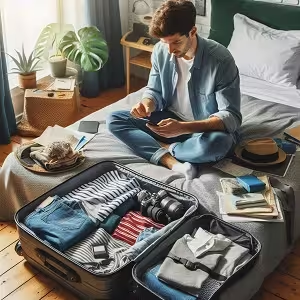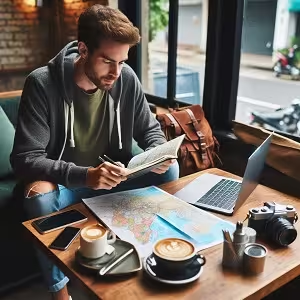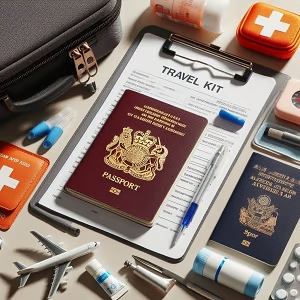Introduction
Your fist trip to Europe might be like entering a storybook. This continent offers you a wealth of history, culture, and magnificent scenery. However, first-time visitors may find number of challenges. That’s why pre-trip planning is essential for making the most of your fist European visit. So, let’s have a look at this travel guide to Europe with some key ideas and insights to help you navigate this fascinating adventure.
Getting Ready For Your Trip

Setting a Budget:
First things first, that is money. It depends on how you organize your trip, Europe can be a low-cost getaway or a luxurious vacation. Go with a reasonable budget that should include lodging, transportation, food, and activities costing. Always look for airline and lodging savings, and don’t forget to include unexpected purchases like sweet treats or unique gifts in your budget.
Selecting Your Destinations:
Europe is a diverse mix of many countries. Each country has its own unique appeal whether you like romanticism of Paris or the historical charm of Rome, or even the positive energy of Berlin, selecting the correct location is always crucial. Think of what interests you most like art, history, cuisine, or nature and then design your trip accordingly. For a comprehensive tour, combine major cities with lesser-known treasures to see true local life.
Best time to visit:
Timing is critical for the success of your vacation. Peak seasons, which are often summer and significant holidays, attract crowds and offer higher prices, as well as bright festivals and crowded streets. Off-peak seasons, such as late spring or early fall, provide a quieter experience at lower rates. Check the weather for your chosen location and pack accordingly to ensure a happy journey.
Plan Your Itinerary

How long to stay?
The length of your stay depends on your destination and interests. To truly see large cities such as London, Paris, and Rome, set aside three to four days. Smaller towns or countryside locales may simply require a day or two. Plan a flexible schedule that allows for random experiences and pauses to see the ambiance.
Must-See Attractions:
Europe is attractive and beautiful and there are many sites you do not want to miss: the Eiffel Tower, the Colosseum, and the Acropolis. Plan on visiting all of the travel gems, too, like the storybook hamlet of Cesky Krumlov in the Czech Republic or Croatia’s stunning Plitvice Lakes. For a unique experience, consider exploring destinations that feel almost otherworldly. Check out our article on the “Top 10 Places on Earth That Don’t Feel Real” to discover some incredible spots that might just make you question reality.
Travel Documents and Essentials

Documentation Requirements:
Ensure that your passport is valid for at least six months after you return home. A visa to enter some European states is required, depending on nationality and origin. To find out about visa requirements, do not hesitate to get information in advance.
Travel Insurance:
Travel insurance is also needed for all your trips; it can protect you against many unexpected situations, really, since a medical emergency, cancellation or curtailment of your trip, and loss of your bags are truly unexpected. Pick best travel insurance policy that must meet your needs. Always compare each company policy to make sure it covers all the areas you’ll be visiting and the activities you’ll be doing.
Packing Tips:
Bring layer able clothing, suitable walking shoes, and basic toiletries because packing less easy to carry. There are many European towns that have narrow streets and a lot of stairs, so bring a lightweight bag. Don’t forget to pack travel adapters, a good guidebook, and any necessary prescriptions.
Getting Around Europe

Transportation Options:
Europe’s transportation network is extremely effective and efficient. Trains, buses, and planes can transport you nearly anywhere around the Europe. Trains are ideal for a pleasing journeys, while cheap planes provide you with speedy, cost-effective links between nations. If you have planned to travel extensively by train, consider obtaining a Eurail pass.
Using Public Transportation:
Public transportation is your buddy in European cities. Metro systems, buses, and trams are generally dependable and economical. Consider day passes or travel cards, which provide unlimited travel for a specified period of time. Download local transit applications to help you explore routes and schedules.
Renting a Car:
Renting a car is a best way to explore rural places. You can go on an epic road adventure as well such as driving down the Amalfi Coast or across the Scottish Highlands. Just ensure your familiarity with the local driving regulations. Booking in advance can save you money, and yeah one more thing is that don’t forget to check if an International Driving Permit is required.
Accommodation Options

Hotels and hostels:
Hotels range from budget-friendly to luxury, providing both comfort and convenience. Hostels are ideal for those travelers who are sociable and wishing to meet people while saving money. Many hostels offer private rooms along with dorms which gives visitors more choices as per their budget.
Vacation Rentals:
Vacation homes, such as those available on Airbnb, provides “make yourself at home” feeling. They are ideal for extended stays, families, or anyone who needs a kitchen to prepare their own meals. Staying in a local area offers a more authentic experience of daily life of locals.
Unique Stays:
Think of a unique lodgings such as Scottish castle, an underground hotel in Cappadocia, or a Swedish tree house. These are such unique places that can turn your trip into an unforgettable memories.
Dining and Cuisine

Local Foods to Try:
Food is really one of the great pleasures of a European vacation. Each culture offers unique delights, such as pasta in Italy, croissants from France, and tapas and gyros in Spain and Greece, respectively. Try local specialties, as well as street and fine dining options.
Dinner Etiquette:
Dining customs differ. Dinners in Spain are typically late, whereas meals in Italy are more leisurely. Tipping policies also vary—in some nations, service is included in the price, whilst in others, a little gratuity is expected. Researching these customs can help you eat like a local.
Budget-Friendly Food:
Healthy foods don’t have to be expensive. Try to find budget-friendly and delicate food options at local markets, bakeries, and food stalls. Many cities now offer fixed price menus for lunch, which is the best option to enjoy delicious meals at a lower cost.
Safety Tips for Travelers

Staying Safe in Crowded Areas:
Tourist sites may attract pickpockets. In this travel guide to Europe, we advice you to keep your valuables safe and be alert always. Avoid displaying any expensive items like a gold watch, ring, necklace, locket etc. A money belt or an anti-theft pouch can add more safety.
Health and Wellness Tips:
Stay healthy while you travel. Drink plenty of water, get enough sleep, and eat nutritious foods. Always keep a basic first-aid kit with you that includes prescription medicines if you need them. Before you travel to remote places, check whether any vaccines or other precautions are required.
Emergency Contacts and Resources:
Keep a list of emergency contacts, such as your relatives and friends, local police, your country’s embassy, and any travel help services. Such data is quite useful in unforeseen situations.
Cultural Etiquettes and Customs

Respecting Local Traditions:
Each European country has distinct cultural norms. Dress modestly when visiting holy sites, meet locals cordially, and get to know the local customs and habits. A little research can leads to showing respect and improving your vacation experience.
Language Tips:
Learning a few basic phrases in the local tongue can be quite useful and appreciated. Simple greetings, thank-yous, and courteous sentences demonstrate respect and can improve interactions. Translation applications can also be useful tools.
Tipping Etiquette:
Tipping customs differ. In some nations, service is provided, but in others, a little tip is expected. To avoid unpleasant situations, learn the tipping rules of each country you visit.
Fun and Relaxation

Beaches and Resorts:
From the sunny Mediterranean shores to the rocky Atlantic coasts, Europe has got great beaches and resorts. Beautiful beaches and world-class resorts are seen in locations like the French Riviera, the Greek islands, and Portugal’s Algarve.
Top Parks and Nature Reserves:
Nature lovers across the continent can explore beautiful parks and reserves. The Swiss Alps, Plitvice Lakes of Croatia, or Norwegian Fjords will win your heart. All of these natural reserves provide the right retreat from everyday life.
Nightlife & Entertainment:
European nightlife is legendary. Berlin, Barcelona, and Amsterdam are all very party-loving cities. From classy bars and clubs to live music and cultural shows, everything is available to you.
What is the best way to exchange currencies in Europe?
Utilize ATMs ast these machines usually give better rates than currency exchange offices. You may, however, need to notify your home bank of travel to avoid problems with your card.
How do I stay connected to the internet while traveling?
Get a local SIM or an overseas phone package. Many hotels, cafes and other places offer free Wi-Fi, but a portable Wi-Fi device may be a handy back-up.
What if I lose my passport?
In the event of you losing your passport, contact the police and notify your local embassy or consulate. They can guide you on obtaining a replacement or getting emergency travel documents.

